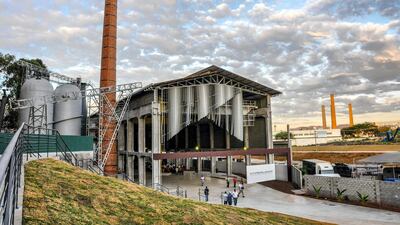Building blocks in the future design of how the earth’s population may transport itself around the planet have been positioned in place -12,000 kilometres away from Abu Dhabi in the industrial heart of Brazil.
The capital may yet be the first major city to benefit from Hyperloop Transportation Technologies, with an ongoing feasibility study likely to determine if the high speed magnetic levitation system comes to the UAE, but the rest of the world is beginning to take notice.
A former foundry covering 22,000 square metres in Contagem, near Brazil’s sixth largest city Belo Horizonte, has been transformed into a potential freight and cargo hub from which the technology can operate.
“In this area, the government wants to give us the space for a freight terminal,” said Bibop Gresta, president and co-founder of Hyperloop Transportation Technologies.
“Because of the feasibility studies for a passenger service that have already been done in Abu Dhabi, we are slightly behind here in Brazil with the freight service, but it will continue developing in phases.
“The size of Brazil is not a problem. We have built and tested prototypes. Now is the time to build. We are past the time of testing in the desert.
“Passenger tubes and capsules have arrived in Toulouse, and we are connecting that side of the technology very soon.”
The Contagem hub will also serve as an innovation centre, with a Hyperloop academy collaborating with local universities to help tutor some of the country’s brightest minds.
“This is the first of a series of research and development centres similar to the one we have in Toulouse where we are currently building a full scale Hyperloop system,” said Mr Gresta, who has not yet said when the technology will be commercially available.
“It will be an incubator for technologies and an experimental space for freight services. The Hyperloop system is creating a technology that is similar to that of the space technology.”
Much like the UAE, the region of Minas Gerais has become a hotbed for innovation, inviting established tech companies like Google and start-ups to thrive with government backing.
Although no Brazil routes have been announced, government is onside to help fast track development of the technology that its developers claim will change the world.
The prospect of removing haulage traffic from the region’s congested roads is an attractive proposition widely welcomed by government officials, while the community is eagerly anticipating the opportunity of more jobs.
Hyperloop is fast developing into an industry with a busy market place.
Whilst other tech firms like Hyperloop One are developing their own versions of passenger pods, newcomers TransPod, a Canadian start-up, is planning a prototype track in Limoges, France and the hope of attracting $50 million of investment.
Whilst rival companies continue to emerge, HTT looks like becoming the first to make the long held dream of supersonic public transport an accessible reality.
A kilometre-long passenger ready test track in Toulouse, another city in line to benefit from the technology, is due to be ready later this year.
Travelling at 1200 km per an hour may not be for everyone, but NASA astronaut and HTT ambassador Yvonne Cagle, claims the experience will feel as effortless as travelling by plane.
“Examining the challenges placed on the human body by travelling at supersonic speeds and pushing our physical capabilities to the limit has helped us to understand what impact travelling by Hyperloop will have,” said Dr Cagle.
“There is a resilience of the human body and it has an ability to adapt. Hyperloop is capable and ready to push those boundaries.
“It is feasible for humans to travel this way, and it has been a privilege to bring the lessons we have learned from space technology to develop the Hyperloop experience.”
Dr Cagle’s career started in biochemistry and then moved into aerospace physiology in high performance jets and the effect on the human body.
She is currently assigned to the Johnson Space Centre’s Space and Life Sciences Directorate.
“Most of the physical effects will be experienced in the transition phase of travelling by Hyperloop,” she said.
“This is something many of us will already have experienced before with acceleration, either spinning around on roller skates or diving into a swimming pool.
“After than initial acceleration, the speed is hardly noticeable at all. It will feel more like travelling on an aircraft than a roller coaster, for example.”
_________________
Read more:
Hyperloop study a watershed moment for technology in the UAE
Saudi Arabia says Virgin Hyperloop One rapid-transit system will be catalyst for growth
Global race to bring first Hyperloop to passengers goes into hyperdrive
_________________
Experts who have bought into the HTT project are giving up their time for free, in exchange for shares in the company.
That collaborative business model has attracted some of the finest scientists from around the world including NASA, Harvard and MIT.
Developers claim the technology has the potential to become intercontinental and connect countries with hugely reduced travel times and also eco-friendly – with current systems being tested powered by solar, wind, geo-thermal and kinetic energy.
“Brazil is very different to the UAE, but there are big opportunities in both countries and we are now looking at the demands and what is required from us,” said Andres de Leon, chief executive of Hyperloop.
“It is important for the UAE to understand that we are trying to connect this technology around the world – with Toulouse, Belo Horizonte and Abu Dhabi where the technology and innovation will be shared.
“It will play a part in creating jobs of the future, and the dynamics of these economies.”


